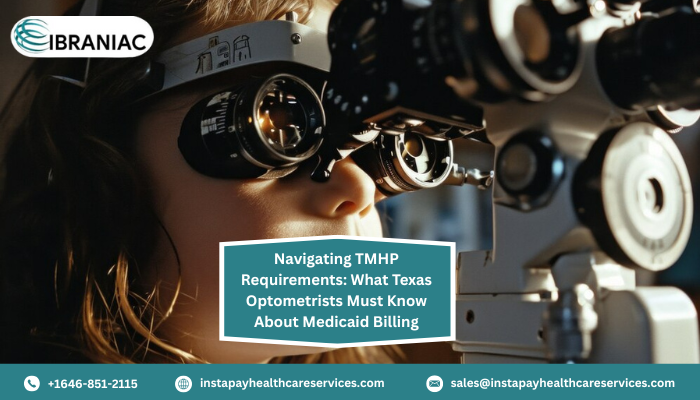
Navigating TMHP Requirements: What Texas Optometrists Must Know About Medicaid Billing
For optometrists serving Medicaid patients in Texas, understanding the billing requirements that are set by the Texas Medicaid & Healthcare Partnership (TMHP) is important. Unlike commercial payers or Medicare, TMHP enforces detailed, optometry-specific guidelines that significantly impact claim approval and reimbursement timelines. Failing to follow these policies results in denials, audits, or lost revenue. This is when compliance becomes a key aspect of successful optometry billing in Texas.
Understanding TMHP’s Role in Texas Medicaid
TMHP is the designated contractor that administers Medicaid claims for the Texas Health and Human Services Commission (HHSC). It processes claims, manages provider enrollment, and enforces the Medicaid guidelines specific to different provider types—including the optometrists.
Optometrists must be enrolled with TMHP to provide services to Medicaid recipients. Once enrolled, they are responsible for adhering to TMHP’s Vision Services Handbook, which outlines covered services, limitations, coding requirements, and documentation standards that apply specifically to optometry.
TMHP Guidelines Unique to Optometry
What sets TMHP apart for optometrists is its strict definition of routine vs. medical eye care and how each is reimbursed. For example, a routine eye exam (such as CPT 92002 or 92004) must be billed with refractive diagnosis codes. However, medical diagnoses—like diabetic retinopathy or conjunctivitis—require different CPT codes and supporting documentation. Using incorrect code combinations is a common error in optometry billing in Texas, and TMHP frequently denies claims for such mismatches.
Eyewear and Materials: Billing Nuances
Eyewear billing under TMHP is another area that often causes confusion. TMHP has a fixed list of covered frame styles, lens materials, and enhancements. Optometrists must use specific Texas Medicaid Vision Procedure Codes when billing for these items. Attempting to bill for non-covered enhancements—such as anti-reflective coatings or designer frames—without prior authorization will lead to denials.
Furthermore, TMHP requires providers to dispense eyewear within a specified time frame and document patient receipt. Failure to do so can result in recoupment during audits. This level of detail is one of the unique challenges of optometry billing in Texas through TMHP.
Prior Authorizations and Documentation
Certain optometry services—especially medically necessary exams outside routine frequency limits—require prior authorization from TMHP. Providers must submit supporting clinical documentation justifying the service, including exam findings, diagnosis codes, and treatment plans.
Even when prior authorization is not required, TMHP may request records for post-payment review. Having clean, comprehensive documentation is essential to protecting your practice from payment recovery efforts.
Final Thoughts
Tackling TMHP’s optometry-specific billing guidelines requires more than just basic optometry billing knowledge. It demands a working understanding of coding, documentation, frequency limits, and service eligibility under Texas Medicaid rules. For any practice involved in optometry billing in Texas, staying compliant with TMHP policies is essential for long-term financial health. Add to this the daily practice functions, optometrists can not possibly do it all- handling the administrative work as well as being fully available to their patients. This is when a billing specialist that understands optometry nuances along with Texas laws become helpful. Handling everything from patient registration to accurately coding the claims to billing the claims to submission to the final payment posting, Instapay Healthcare Services is a one-stop solution for optometry billing needs in Texas.
Working with a billing partner that is experienced in TMHP regulations, like Instapay Healthcare Services, can streamline operations, reduce errors, and improve cash flow—so you can stay focused on delivering quality eye care.
Working with a billing partner that is experienced in TMHP regulations, like Instapay Healthcare Services, can streamline operations, reduce errors, and improve cash flow—so you can stay focused on delivering quality eye care.
Streamline your optometry billing in Texas today with Instapay Healthcare Services. Call us right away!




